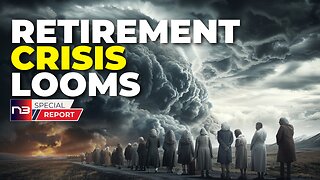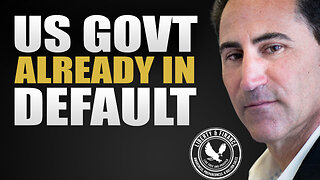Supreme Canon on Raising the Retirement Age? , USA will purposefully default on its debt,
To Watch Full Episode and to watch live Every Saturday ! Go here ! - https://odysee.com/@MikeMartins:7/Mikeinthenight542:3
Buy Mike A Coffee - https://donorbox.org/buy-me-a-coffee-53
Link to the Most Powerful Glutathione in the World - https://mikeinthenight.neumi.com/home
#mikeinthenight #mikemartins
Raising Retirement Age:
The discussion revolves around the idea of raising the retirement age, potentially due to financial constraints and unfunded liabilities. The implication is that there might not be enough money to sustain current retirement benefits, leading to a need for adjustments.
Financial Challenges and Population Dynamics:
The conversation touches on the financial challenges cities or countries may face, especially when dealing with unfunded liabilities like pensions. It also highlights concerns about changes in population dynamics, such as delayed family planning and its impact on the traditional population model.
Actuarial Considerations and Vaccine Debacle:
The talk delves into actuarial considerations and whether certain decisions, such as vaccine distribution, could have underlying motives related to managing the aging population. The speculation involves potential strategies to navigate through demographic challenges.
Potential Civil Unrest:
The fear of civil unrest is discussed, particularly if there were to be significant cuts to pensions or if older individuals are adversely affected. The importance of maintaining psychological control and public trust in government is emphasized.
Universal Basic Income (UBI):
UBI is mentioned as a potential solution or response to economic challenges. However, there's skepticism about its effectiveness, with some viewing it as a bailout for landlords and banks rather than a direct benefit to individuals.
Global Debt Default:
The second part of the discussion involves the possibility of the USA intentionally defaulting on its foreign debt. This raises concerns about the impact on the global economy and the potential repercussions, including the loss of reserve currency status and economic consequences.
Tea Leaf Reading and Predictions:
The conversation acknowledges the difficulty of predicting the future with certainty. The speaker mentions that while certain financial challenges have historical precedents, predicting the timing and specific outcomes remains challenging.
Inflation and Interest Rates:
Historical events, such as the US going off the gold standard in the 70s and facing inflation, are referenced. The discussion includes the drastic measures taken, such as high-interest rates, to stabilize the economy during that period.
Negativity vs. Prophecy:
There's a distinction made between expressing concerns and being negative. The speaker suggests that the intention is not pessimism but rather an attempt to foresee potential challenges and find solutions.
Financial Crisis and Economic Fracture:
The conversation alludes to the fragility of the current economic system and the potential for a financial crisis that could lead to economic fracture, both domestically and globally.
retirement age, financial challenges, population dynamics, actuarial considerations, vaccine distribution, civil unrest, psychological control, public trust, universal basic income, UBI, bailout, landlords, banks, global debt default, reserve currency, economic consequences, tea leaf reading, predictions, inflation, interest rates, historical events, pessimism, prophecy, financial crisis, economic fracture, demographics, geopolitical factors, current events, future developments, economic system, global economy.
-
 25:03
25:03
Midas Gold Group
3 months agoThe Ultimate Crisis Asset | The Gold Standard 2409
35 -
 7:30
7:30
Rethinking the Dollar
2 months agoThe American Household Meltdown: Why Families Are Drowning In Unpayable Debt
9533 -
 10:19
10:19
NextNewsNetwork
2 months agoRetirement Crisis Looms: Experts' Dire Warnings You Can't Afford to Ignore, Act Now
1.15K3 -
 10:52
10:52
Worldview Financial TV
5 months agoThe Debt Danger Looming
321 -
 25:03
25:03
Midas Gold Group
4 months agoDebts and Deficits | The Gold Standard 2403
20 -
 8:03
8:03
Meta Stats
3 months agoShocking Truth: TOP 20 Countries Drowning in Debt!
17 -
 8:39
8:39
Rik617
4 months agoRetirement Meltdown 2024: America's Retirement Crisis Reaches Critical Levels
94 -
![[With Subtitles] Credit Crisis Hits Worst Level Since Great Recession As Millions Of Americans Go Bankrupt](https://hugh.cdn.rumble.cloud/s/s8/1/S/S/n/G/SSnGr.0kob-small-Credit-Crisis-Hits-Worst-Le.jpg) 13:22
13:22
RAVries
1 month ago[With Subtitles] Credit Crisis Hits Worst Level Since Great Recession As Millions Of Americans Go Bankrupt
7046 -
 36:17
36:17
Liberty and Finance
2 months ago $5.42 earnedUS Debt Default Through Inflation | Michael Pento
2.44K12 -
 8:32
8:32
Meta Stats
3 months agoCountries That Are Financially Unbreakable in 2024! #DebtFree"
51